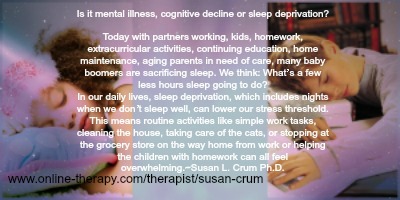
Today with partners working, kids, homework, extracurricular activities, continuing education, home maintenance, aging parents in need of care, many baby boomers are sacrificing sleep. We think: What’s a few less hours sleep going to do?
The fact is that if you don’t get enough hours of restorative sleep your brain takes little mini sleeps, micro seconds at a time, throughout the day. This may be one reason that sleep deprivation is a huge public safety hazard. For instance, sleep deprivation reportedly played a role in the 1986 Chernobyl nuclear meltdown and the 1979 Three Mile Island accident.
In our daily lives, sleep deprivation, which includes nights when we don’t sleep well, can lower our stress threshold. This means routine activities like simple work tasks, cleaning the house, taking care of the cats, or stopping at the grocery store on the way home from work or helping the children with homework can all feel overwhelming.
REM (Rapid Eye Movement) sleep aids the formation of our memories. Deep sleep fosters the formation of connections between cells helping short term and intermediate memories become long term memories. This is why staying up all night to study before an exam is usually counterproductive. It is better to study a bit each day, and get a good night sleep before your exam.
A lack of sleep can also negatively affect our creativity and ability to be innovative. It can contribute to decreased social ability and make use less positive and hopeful. For many of us, being tired causes us to feel hungrier and to seek out foods with sugar and caffeine. In fact, recent research (Benedict, et al., 2012) shows that acute sleep loss increases the pleasure response in the brain which drives us to consume food. So, it may be that chronic sleep deprivation is one factor in the rising levels of obesity and diabetes in urbanized civilizations.
Even more frightening, sleep deprivation is one of the factors that can lead to an increased risk of cardiac morbidity due to increases in inflammation that are associated with the development of cardiovascular disease. Additionally, there are a number of studies which have shown that sleep deprivation leads to increased blood pressure.
An essential fact is that without sleep our brains deteriorate; which means that our ability to control our behavior also deteriorates. Insufficient sleep slows our response speed and decreases the consistency in our performance especially when attention and vigilance are required. It negatively affects our creative problem solving, and ability to adapt to unexpected demands. It impedes our ability to modulate our emotional reactions; which in turn can lead to arrange of problems when interacting with others. There is also a strong link between sleep deprivation and depression.
The fact is that health is mentally and physically restorative and we all need to insure that we obtain enough quality sleep. This is why I so often work with patients on the development of a healthy sleep environment and a healthy sleep regime. Healthy adults need an average of seven to eight hours sleep each night; assuming you don’t have a sleep debt from prior sleep deprivation. Very young children and teenagers may require much more sleep.
According to the National Sleep Foundation, here are the routine amounts of sleep we need:
|
Age
|
Average Sleep Needed
|
|
Newborns 0-2 months
|
12 to 18 hours daily
|
|
Infants 3 to 11 months
|
14 to 15 hours daily
|
|
Toddlers 1 to 3 years
|
12 to 14 hours daily
|
|
Preschoolers 3 to 5years
|
11 to 13 hours daily
|
|
School age children 5 to 10 years
|
10 to 11 hours daily
|
|
Preteens and Teens 10 to 17
|
8.5 to 9.25 hours daily
|
|
Adults
|
7-9 hours daily
|
If you or someone you know is experiencing daytime sleepiness or fatigue, snoring, tingling or leg cramps, gasping or difficulty breathing during sleep; prolonged insomnia or anything else that is preventing your from sleep well consult with your psychologist or sleep specialist. Keep a diary of your sleep habits over a week or two and bring this diary to your psychologist.
Make getting enough hours of sound sleep a priority. This means maintaining consistent sleep and wake schedules even on weekends. It also means having a regular relaxing bedtime routine like listening to soothing music. You also want an environment that is conducive to sleep. It should be dark, comfortable and cook with a comfortable mattress and pillow. Avoid caffeine, alcohol and sugar products close to bed time and finish eating about three hours before your regular bedtime. It is also important to exercise regularly. The average individual wants to walk about ½ mile for each year of age up until a total of five miles daily.
If problems with mood, attention and memory persist after you have maintained a healthy sleep regime for about three months, then contact your psychologist to see if there is something else going on that should be treated.
Presented as a community service by:
Susan L. Crum, Ph.D.
Licensed Psychologist
http://www.online- therapy.com/therapist/susan-crum
About the Author

Dr. Susan Crum
, Ph.D., A.B.P.S., QEEG DiplomateI am a Licensed Psychologist, conducting neuropsychological screenings and evaluations, Quantitative EEGs, neurofeedback, biofeedback, cognitive rehabilitation, entrainment, CES, treatment for stress-related medical disorders, anxiety, depression, ADHD, autism, chronic pain and chronic fatigue. The mind and body are intricately linked therefore, I partner with you to address both mental health problems such as anxiety and depression and stress related physical problems.
Office Location:
3205 Physicians Way
Sebring, Florida
33870
United States
Phone: 863-402-2222
Contact Dr. Susan Crum
Professional Website:
http://cfln.webs.com/